Blog

Programmatic ad platforms has revolutionized affiliate marketing, making ad buying and placement more efficient and data-driven. As we head into 2024, staying ahead in the competitive world of digital marketing means leveraging the best programmatic ad platforms available. This article will guide you through what programmatic advertising is, the types of platforms available, and the top programmatic ad platforms in 2024 that can elevate your advertising efforts.
Programmatic advertising is the automated process of buying and selling digital ad space in real-time. It replaces the traditional, often cumbersome, manual methods of ad buying with advanced technology that leverages algorithms, artificial intelligence, and vast amounts of data to make the process more efficient, targeted, and scalable.
At its core, programmatic advertising operates through a real-time bidding (RTB) system. When a user visits a website or opens an app, a signal is sent to an ad exchange, where a rapid auction takes place among multiple advertisers who are competing for that ad space. This auction happens in milliseconds, allowing the winning ad to be displayed almost instantly.
The entire process is automated, meaning there is minimal human intervention. Instead, complex algorithms determine the best ad to serve to a particular user based on a variety of factors, such as their demographics, browsing behavior, location, and even the time of day. This level of precision targeting helps ensure that ads are relevant to the user, increasing the likelihood of engagement and conversion.
While programmatic advertising offers many advantages, it also comes with its challenges. Issues such as ad fraud, brand safety, and the complexity of managing data and technology can pose risks. To combat ad fraud, ad networks are increasingly using advanced anti-fraud software and traffic filtering systems that leverage machine learning to detect and block fraudulent activity in real-time. Additionally, some platforms implement manual review processes to further ensure the quality of traffic.
Programmatic advertising is supported by a variety of platforms, each serving a unique role in the ecosystem. Understanding these platforms is essential for advertisers and publishers alike, as they offer different functionalities that cater to specific needs within the programmatic landscape. Below, we’ll explore the key types of programmatic platforms, detailing how they operate and the value they bring to the digital advertising process.
Read about the difference between DSPs and ad networks in our blog:
Understanding how different programmatic platforms interact is crucial for grasping the full picture of how digital ad space is bought and sold. The relationship between these platforms ensures a seamless flow of information, allowing advertisers to target their audiences effectively and publishers to maximize their revenue.
A visual representation of how these platforms are connected.

Explanation:
This interconnected system ensures that programmatic advertising is efficient, targeted, and effective, benefiting all parties involved — from advertisers seeking to reach the right audience to publishers aiming to monetize their content optimally.
Here is a detailed overview of the best programmatic advertising platforms to consider for your campaigns this year.
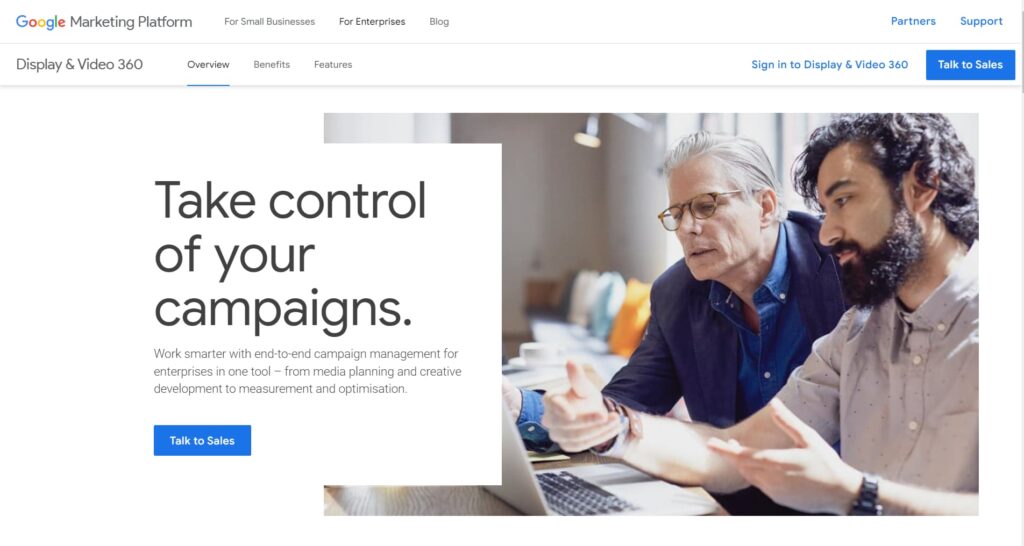
Google Display & Video 360 (DV360) remains a powerhouse in the programmatic advertising world, offering a comprehensive suite of tools that cater to advertisers looking for extensive reach and precise targeting.
As part of the Google Marketing Platform, DV360 provides advertisers with access to a vast inventory across display, video, mobile, TV, and audio channels. What sets DV360 apart is its integration with other Google tools, such as Google Analytics and Google Ads, enabling seamless campaign management and optimization. DV360’s advanced targeting options, including audience segmentation, contextual targeting, and lookalike audiences, make it a versatile choice for advertisers. Additionally, its robust reporting and analytics features provide deep insights into campaign performance.
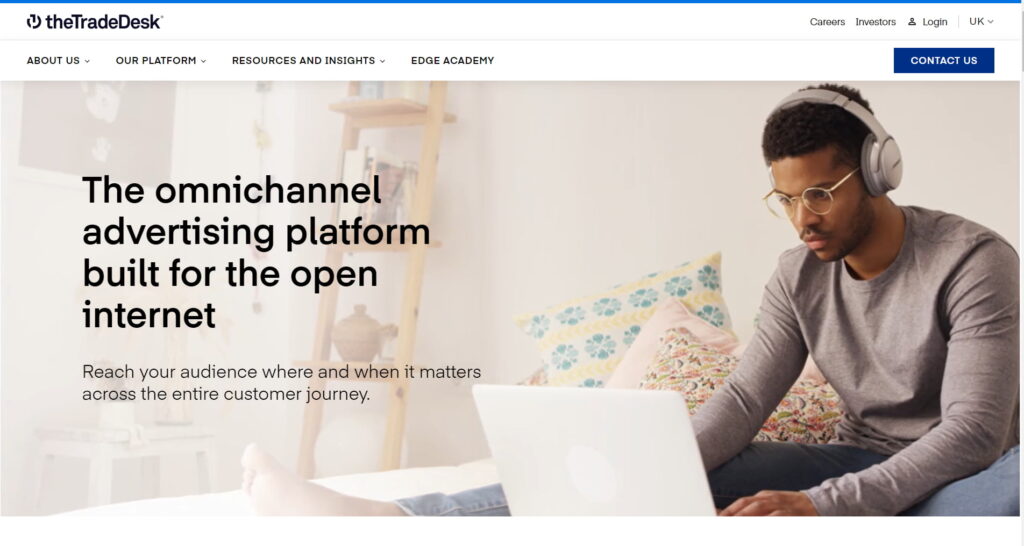
The Trade Desk is renowned for its user-friendly programmatic ad network and powerful data integration capabilities, making it a top choice for advertisers seeking precise audience targeting and real-time optimization.
The Trade Desk offers a highly intuitive interface that simplifies the complex world of programmatic advertising. It supports a wide range of ad formats, including display, video, audio, and connected TV (CTV), providing advertisers with flexibility in how they reach their audiences. One of the standout features of The Trade Desk is its extensive data partnerships, which allow advertisers to leverage third-party data for more effective targeting. The platform also excels in cross-device targeting, ensuring that campaigns are delivered consistently across different devices.
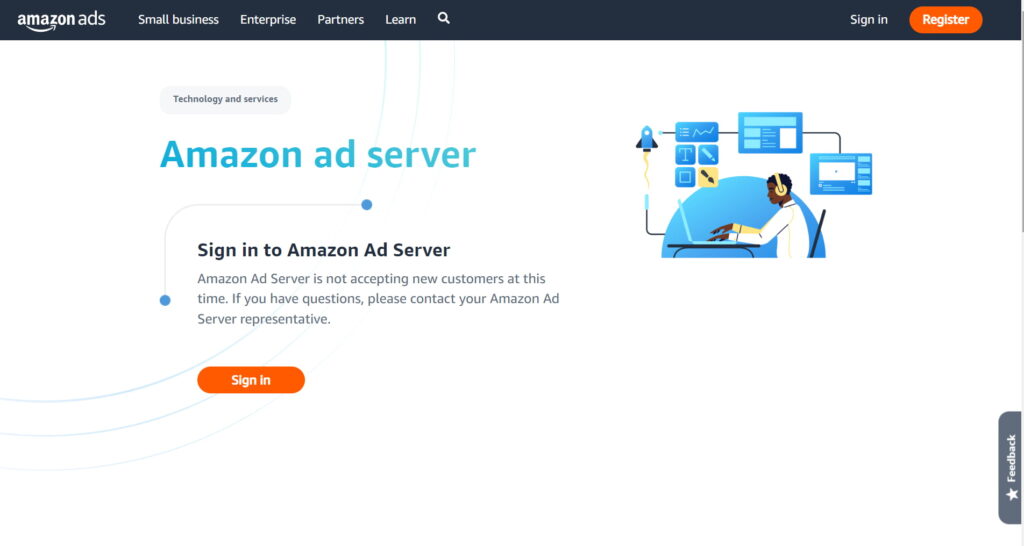
Amazon Ad Server, previously known as Sizmek by Amazon, remains a powerful and flexible ad management platform, seamlessly integrating with various DSPs. The platform supports a wide range of ad formats, including display, video, and native, and is particularly noted for its dynamic creative optimization (DCO) capabilities, which allow for real-time personalization of ads based on user data.
As part of the Amazon ecosystem, the platform now offers enhanced features that further streamline the campaign management process. These include a refreshed user interface, improved campaign management tools, and new reach and frequency metrics powered by machine learning. Additionally, Amazon Ad Server provides deep integration with Amazon DSP and Amazon Marketing Cloud (AMC), enabling advertisers to unlock unique insights and drive more effective campaigns.
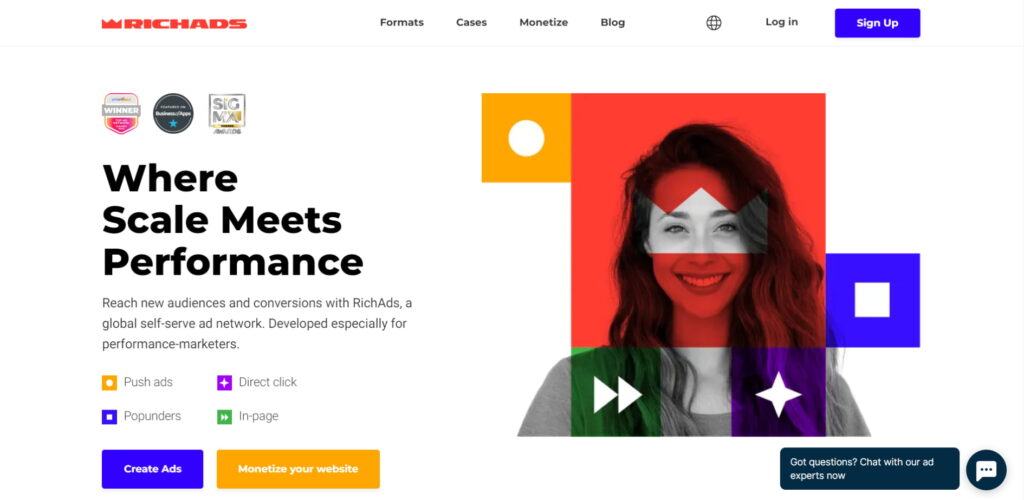
RichAds is one of the top PPC ad networks working based on RTB action. The network specializes in delivering high-quality push, popunder, direct click, and native ads, with a strong emphasis on push traffic. Designed specifically for affiliate marketers and advertisers, RichAds excels in verticals like Gambling, Betting, Adult, Nutra, and Dating. The network operates on a CPC model for push ads, which is its primary focus, while popunder traffic is sold on a CPM basis, making it the second most popular format on the platform.
RichAds stands out with its advanced targeting features, especially for mobile campaigns, and its innovative Performance Mode, which can boost conversion rates by up to 253%. Dedicated to supporting the affiliate marketing community, RichAds regularly engages through webinars, social media, and industry conferences. Additionally, the network provides valuable insights in its blog, including a monthly list of top-performing GEOs for each ad format, helping users optimize their campaigns effectively.
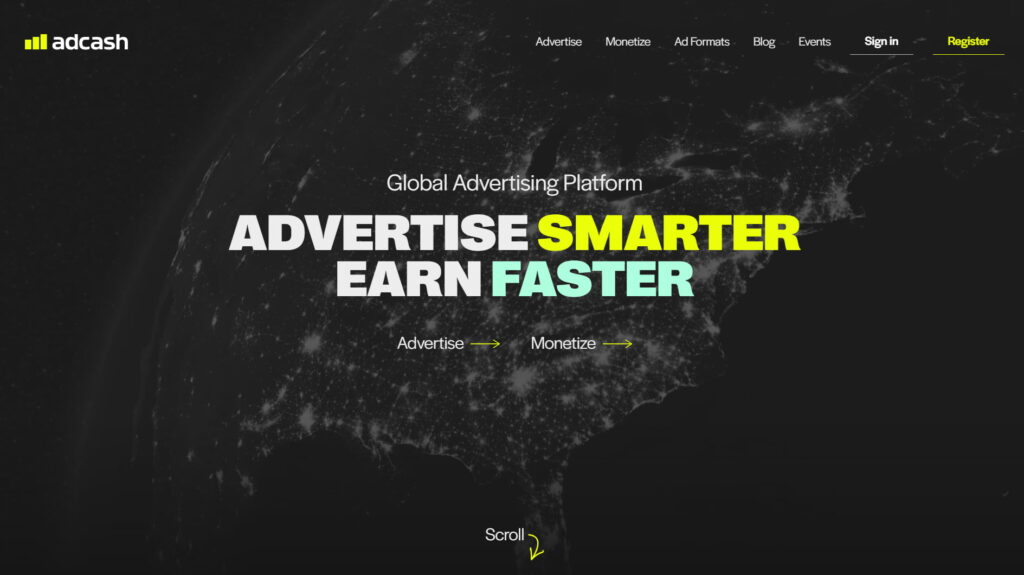
AdCash, established in 2007, has become a global powerhouse in the ad network space, particularly recognized for its ability to drive sweepstakes traffic and its extensive experience in promoting related offers. The platform offers a diverse range of ad formats, including native ads, in-page push, popunder, interstitials, and banners. A standout feature of AdCash is the ability to use unlimited creatives across any chosen ad format, allowing for extensive campaign customization. The daily minimum budget is $10, meaning the platform is accessible to advertisers of all sizes.
Advanced targeting options of Adcash enable advertisers to fine-tune campaigns by adjusting device-specific parameters and targeting interest-based segments. For those looking to maximize their campaigns, the platform provides robust tools such as white- and blacklists, allowing advertisers to optimize their traffic sources effectively. This combination of features makes AdCash a versatile and user-friendly platform for running successful ad campaigns across various verticals.
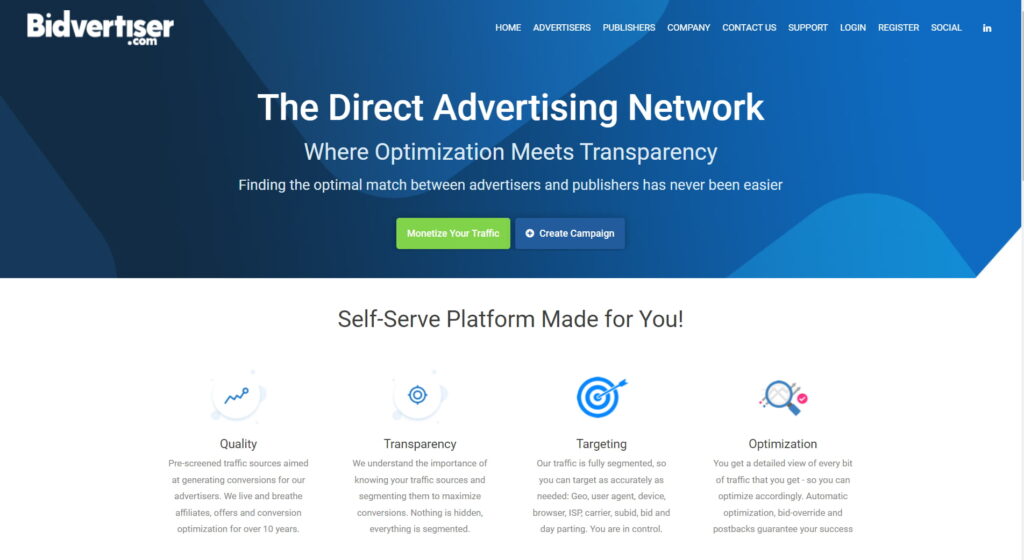
BidVertiser is a programmatic ad network that offers a powerful platform for advertisers looking to optimize their campaigns with precision. With over 10 billion monthly ad impressions and coverage across 196 countries, BidVertiser provides extensive reach, making it a go-to choice for advertisers aiming to tap into global markets. Discover more benefits of the platform in the BidVertiser review.
Operating on a CPC pricing model, BidVertiser offers highly competitive rates, with a minimal CPC for push ads as low as $0.001. A key feature of BidVertiser is its Quality Score option, which enables advertisers to select the quality of traffic they wish to purchase, measured in percentages. For instance, starting with a 70% Quality Score allows for a strategic balance between cost and traffic quality, with the flexibility to adjust based on campaign performance.
The platform supports a variety of ad formats, including popunder, push ads, in-page push, and native ads, catering to diverse advertising needs. Advertisers can conveniently create and launch campaigns using a detailed video tutorial, ensuring a smooth setup process. A minimal deposit of BidVertiser is $100, making it accessible to a wide range of advertisers.
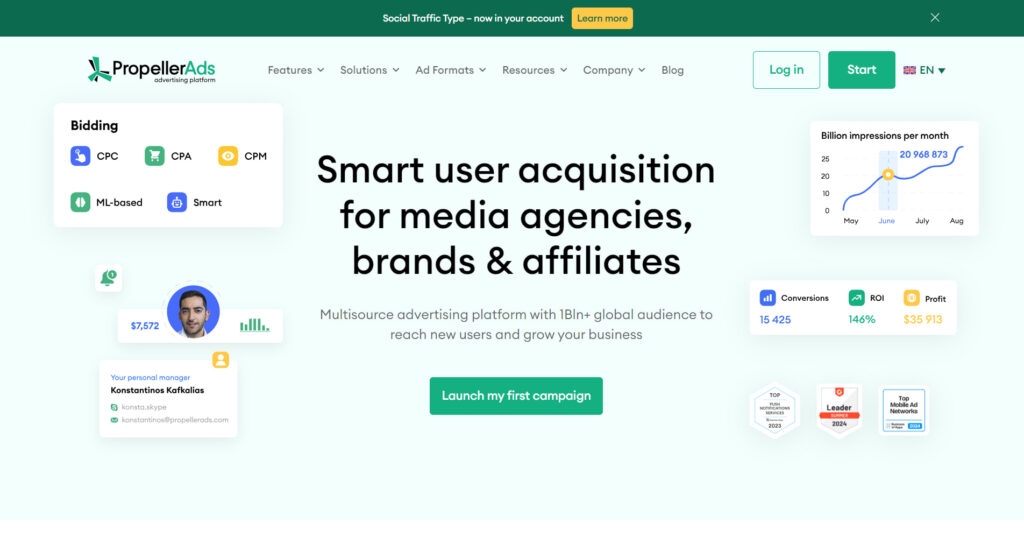
PropellerAds is an advanced ad network that uses AI-powered algorithms to boost conversions, automate campaign setup, and reduce ad spend. The platform offers precise targeting options, including push notifications based on user activity, gender, and interests, allowing for effective retargeting strategies. Its CPA Goal bidding system can lower traffic costs by up to 40% compared to manual bidding.
Recently, PropellerAds introduced social media traffic, which excels in verticals like Utilities, Mobile Apps, Finance and other niches. Known for its strength in E-commerce, Betting, Gambling, and Sweepstakes, the network enforces strict content policies, particularly against adult content.
Know about PropellerAds alternatives in our article!
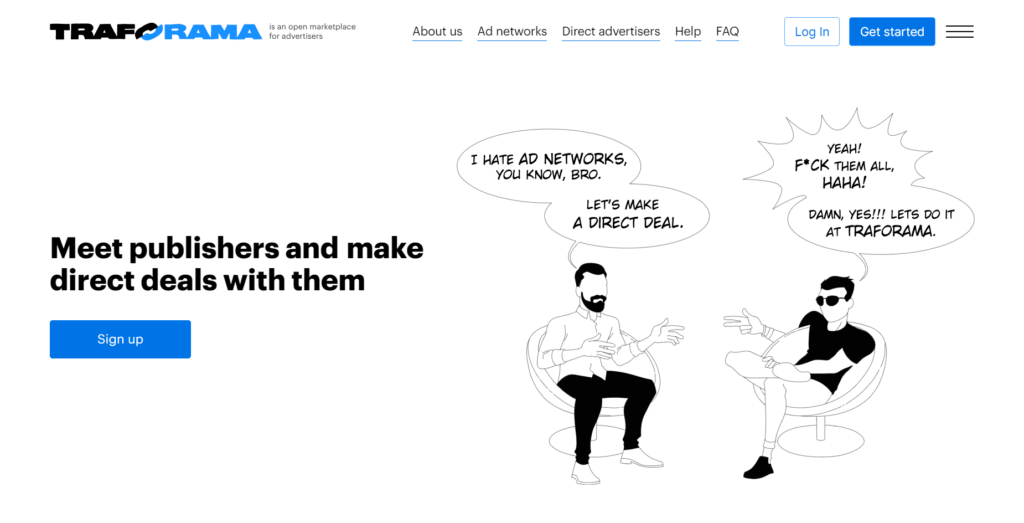
Traforama is an innovative DSP (Demand-Side Platform) that provides a direct marketplace for advertisers and publishers, eliminating intermediaries to ensure transparent and efficient transactions. Launched in 2020 by the team behind AdSpyglass, Traforama has quickly established itself as a valuable tool for digital marketers. The platform cooperates with over 2000 publishers and delivers more than 30 million visitors daily, with traffic spanning across 220+ countries.
Advertisers have access to a wide array of ad formats, as it’s clearly shown in the Traforama review, including popunder, interstitial, banner, in-video pre-roll, in-page push, and slider ads. The platform offers flexible options for purchasing traffic, such as direct campaigns, flat deals, and Real-Time Bidding (RTB). The minimal CPM on Traforama is $0.002, with rates varying by GEO.
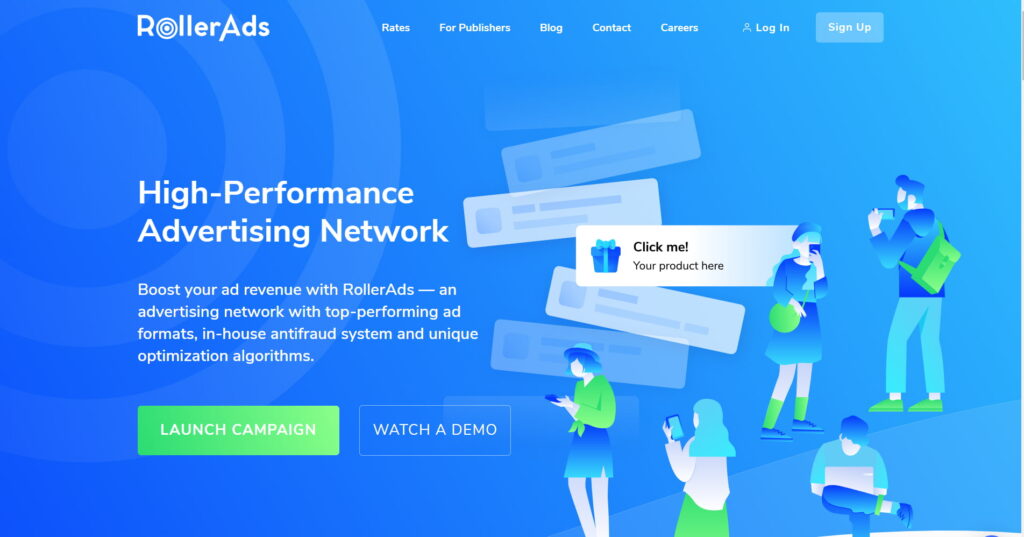
Launched in 2019, RollerAds has rapidly established itself as a major player in the affiliate marketing space, boasting a network of over 10,000 direct publishers and delivering a staggering 2 billion impressions daily. The platform offers a diverse range of ad formats, including push ads, in-page push, calendar notifications, and popunders, catering to a wide spectrum of advertising needs.
RollerAds’ impact is evident in its impressive numbers: the platform has driven over 11 million conversions and generated more than 620 billion impressions since its inception. Key regions include the US, LATAM, Europe, and Asia.
RollerAds is particularly effective for mainstream verticals, offering high-quality traffic that can drive significant results in competitive markets. The entry point is merely $50. Plus, the network is included in the selection of push networks with the cheapest traffic.
Programmatic advertising continues to be a cornerstone of digital marketing, offering unparalleled efficiency, precision, and scalability. The platforms highlighted in this guide represent the best in the industry for 2024, each providing unique features and benefits tailored to different advertising needs.
Selecting the right programmatic platform depends on your specific advertising goals, target audience, and the type of traffic you wish to generate. By leveraging the strengths of these platforms, you can optimize your campaigns, reach the right users, and maximize your return on investment.
Programmatic ad platforms has revolutionized affiliate marketing, making ad buying and placement more efficient and data-driven. As we head into 2024, staying ahead in the competitive world of digital marketing means leveraging the best programmatic ad platforms available. This article will guide you through what programmatic advertising is, the types of platforms available, and the top programmatic ad platforms in 2024 that can elevate your advertising efforts.
Programmatic advertising is the automated process of buying and selling digital ad space in real-time. It replaces the traditional, often cumbersome, manual methods of ad buying with advanced technology that leverages algorithms, artificial intelligence, and vast amounts of data to make the process more efficient, targeted, and scalable.
At its core, programmatic advertising operates through a real-time bidding (RTB) system. When a user visits a website or opens an app, a signal is sent to an ad exchange, where a rapid auction takes place among multiple advertisers who are competing for that ad space. This auction happens in milliseconds, allowing the winning ad to be displayed almost instantly.
The entire process is automated, meaning there is minimal human intervention. Instead, complex algorithms determine the best ad to serve to a particular user based on a variety of factors, such as their demographics, browsing behavior, location, and even the time of day. This level of precision targeting helps ensure that ads are relevant to the user, increasing the likelihood of engagement and conversion.
While programmatic advertising offers many advantages, it also comes with its challenges. Issues such as ad fraud, brand safety, and the complexity of managing data and technology can pose risks. To combat ad fraud, ad networks are increasingly using advanced anti-fraud software and traffic filtering systems that leverage machine learning to detect and block fraudulent activity in real-time. Additionally, some platforms implement manual review processes to further ensure the quality of traffic.
Programmatic advertising is supported by a variety of platforms, each serving a unique role in the ecosystem. Understanding these platforms is essential for advertisers and publishers alike, as they offer different functionalities that cater to specific needs within the programmatic landscape. Below, we’ll explore the key types of programmatic platforms, detailing how they operate and the value they bring to the digital advertising process.
Read about the difference between DSPs and ad networks in our blog:
Understanding how different programmatic platforms interact is crucial for grasping the full picture of how digital ad space is bought and sold. The relationship between these platforms ensures a seamless flow of information, allowing advertisers to target their audiences effectively and publishers to maximize their revenue.
A visual representation of how these platforms are connected.

Explanation:
This interconnected system ensures that programmatic advertising is efficient, targeted, and effective, benefiting all parties involved — from advertisers seeking to reach the right audience to publishers aiming to monetize their content optimally.
Here is a detailed overview of the best programmatic advertising platforms to consider for your campaigns this year.

Google Display & Video 360 (DV360) remains a powerhouse in the programmatic advertising world, offering a comprehensive suite of tools that cater to advertisers looking for extensive reach and precise targeting.
As part of the Google Marketing Platform, DV360 provides advertisers with access to a vast inventory across display, video, mobile, TV, and audio channels. What sets DV360 apart is its integration with other Google tools, such as Google Analytics and Google Ads, enabling seamless campaign management and optimization. DV360’s advanced targeting options, including audience segmentation, contextual targeting, and lookalike audiences, make it a versatile choice for advertisers. Additionally, its robust reporting and analytics features provide deep insights into campaign performance.

The Trade Desk is renowned for its user-friendly programmatic ad network and powerful data integration capabilities, making it a top choice for advertisers seeking precise audience targeting and real-time optimization.
The Trade Desk offers a highly intuitive interface that simplifies the complex world of programmatic advertising. It supports a wide range of ad formats, including display, video, audio, and connected TV (CTV), providing advertisers with flexibility in how they reach their audiences. One of the standout features of The Trade Desk is its extensive data partnerships, which allow advertisers to leverage third-party data for more effective targeting. The platform also excels in cross-device targeting, ensuring that campaigns are delivered consistently across different devices.

Amazon Ad Server, previously known as Sizmek by Amazon, remains a powerful and flexible ad management platform, seamlessly integrating with various DSPs. The platform supports a wide range of ad formats, including display, video, and native, and is particularly noted for its dynamic creative optimization (DCO) capabilities, which allow for real-time personalization of ads based on user data.
As part of the Amazon ecosystem, the platform now offers enhanced features that further streamline the campaign management process. These include a refreshed user interface, improved campaign management tools, and new reach and frequency metrics powered by machine learning. Additionally, Amazon Ad Server provides deep integration with Amazon DSP and Amazon Marketing Cloud (AMC), enabling advertisers to unlock unique insights and drive more effective campaigns.

RichAds is one of the top PPC ad networks working based on RTB action. The network specializes in delivering high-quality push, popunder, direct click, and native ads, with a strong emphasis on push traffic. Designed specifically for affiliate marketers and advertisers, RichAds excels in verticals like Gambling, Betting, Adult, Nutra, and Dating. The network operates on a CPC model for push ads, which is its primary focus, while popunder traffic is sold on a CPM basis, making it the second most popular format on the platform.
RichAds stands out with its advanced targeting features, especially for mobile campaigns, and its innovative Performance Mode, which can boost conversion rates by up to 253%. Dedicated to supporting the affiliate marketing community, RichAds regularly engages through webinars, social media, and industry conferences. Additionally, the network provides valuable insights in its blog, including a monthly list of top-performing GEOs for each ad format, helping users optimize their campaigns effectively.

AdCash, established in 2007, has become a global powerhouse in the ad network space, particularly recognized for its ability to drive sweepstakes traffic and its extensive experience in promoting related offers. The platform offers a diverse range of ad formats, including native ads, in-page push, popunder, interstitials, and banners. A standout feature of AdCash is the ability to use unlimited creatives across any chosen ad format, allowing for extensive campaign customization. The daily minimum budget is $10, meaning the platform is accessible to advertisers of all sizes.
Advanced targeting options of Adcash enable advertisers to fine-tune campaigns by adjusting device-specific parameters and targeting interest-based segments. For those looking to maximize their campaigns, the platform provides robust tools such as white- and blacklists, allowing advertisers to optimize their traffic sources effectively. This combination of features makes AdCash a versatile and user-friendly platform for running successful ad campaigns across various verticals.

BidVertiser is a programmatic ad network that offers a powerful platform for advertisers looking to optimize their campaigns with precision. With over 10 billion monthly ad impressions and coverage across 196 countries, BidVertiser provides extensive reach, making it a go-to choice for advertisers aiming to tap into global markets. Discover more benefits of the platform in the BidVertiser review.
Operating on a CPC pricing model, BidVertiser offers highly competitive rates, with a minimal CPC for push ads as low as $0.001. A key feature of BidVertiser is its Quality Score option, which enables advertisers to select the quality of traffic they wish to purchase, measured in percentages. For instance, starting with a 70% Quality Score allows for a strategic balance between cost and traffic quality, with the flexibility to adjust based on campaign performance.
The platform supports a variety of ad formats, including popunder, push ads, in-page push, and native ads, catering to diverse advertising needs. Advertisers can conveniently create and launch campaigns using a detailed video tutorial, ensuring a smooth setup process. A minimal deposit of BidVertiser is $100, making it accessible to a wide range of advertisers.

PropellerAds is an advanced ad network that uses AI-powered algorithms to boost conversions, automate campaign setup, and reduce ad spend. The platform offers precise targeting options, including push notifications based on user activity, gender, and interests, allowing for effective retargeting strategies. Its CPA Goal bidding system can lower traffic costs by up to 40% compared to manual bidding.
Recently, PropellerAds introduced social media traffic, which excels in verticals like Utilities, Mobile Apps, Finance and other niches. Known for its strength in E-commerce, Betting, Gambling, and Sweepstakes, the network enforces strict content policies, particularly against adult content.
Know about PropellerAds alternatives in our article!

Traforama is an innovative DSP (Demand-Side Platform) that provides a direct marketplace for advertisers and publishers, eliminating intermediaries to ensure transparent and efficient transactions. Launched in 2020 by the team behind AdSpyglass, Traforama has quickly established itself as a valuable tool for digital marketers. The platform cooperates with over 2000 publishers and delivers more than 30 million visitors daily, with traffic spanning across 220+ countries.
Advertisers have access to a wide array of ad formats, as it’s clearly shown in the Traforama review, including popunder, interstitial, banner, in-video pre-roll, in-page push, and slider ads. The platform offers flexible options for purchasing traffic, such as direct campaigns, flat deals, and Real-Time Bidding (RTB). The minimal CPM on Traforama is $0.002, with rates varying by GEO.

Launched in 2019, RollerAds has rapidly established itself as a major player in the affiliate marketing space, boasting a network of over 10,000 direct publishers and delivering a staggering 2 billion impressions daily. The platform offers a diverse range of ad formats, including push ads, in-page push, calendar notifications, and popunders, catering to a wide spectrum of advertising needs.
RollerAds’ impact is evident in its impressive numbers: the platform has driven over 11 million conversions and generated more than 620 billion impressions since its inception. Key regions include the US, LATAM, Europe, and Asia.
RollerAds is particularly effective for mainstream verticals, offering high-quality traffic that can drive significant results in competitive markets. The entry point is merely $50. Plus, the network is included in the selection of push networks with the cheapest traffic.
Programmatic advertising continues to be a cornerstone of digital marketing, offering unparalleled efficiency, precision, and scalability. The platforms highlighted in this guide represent the best in the industry for 2024, each providing unique features and benefits tailored to different advertising needs.
Selecting the right programmatic platform depends on your specific advertising goals, target audience, and the type of traffic you wish to generate. By leveraging the strengths of these platforms, you can optimize your campaigns, reach the right users, and maximize your return on investment.

Blog

Blog